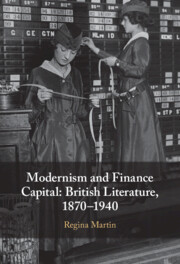Book contents
- Modernism and Finance Capital
- Modernism and Finance Capital
- Copyright page
- Dedication
- Contents
- Acknowledgments
- Introduction
- Part I From Victorian Character to Modernist Professional
- Chapter 1 Finance Capital and the Value Form of Character in Anthony Trollope’s Palliser Series
- Chapter 2 Detecting Modernist Form and the New Professional
- Chapter 3 Speculating Subjects
- Part II Finance Capital and the Economic and Cultural Turn toward London
- Part III Modernism, Affect, and the Rise of the Modern Corporation
- Conclusion
- Works Cited
- Index
Chapter 1 - Finance Capital and the Value Form of Character in Anthony Trollope’s Palliser Series
from Part I - From Victorian Character to Modernist Professional
Published online by Cambridge University Press: 12 December 2024
- Modernism and Finance Capital
- Modernism and Finance Capital
- Copyright page
- Dedication
- Contents
- Acknowledgments
- Introduction
- Part I From Victorian Character to Modernist Professional
- Chapter 1 Finance Capital and the Value Form of Character in Anthony Trollope’s Palliser Series
- Chapter 2 Detecting Modernist Form and the New Professional
- Chapter 3 Speculating Subjects
- Part II Finance Capital and the Economic and Cultural Turn toward London
- Part III Modernism, Affect, and the Rise of the Modern Corporation
- Conclusion
- Works Cited
- Index
Summary
Via an analysis of Anthony Trollope’s Palliser series, this chapter argues that character – the notion that a person’s value is defined by attributes of character – was the dominant value form shaping novelistic poetics under the nineteenth-century industrial economy. Trollope’s novels bear witness to the growing influence of financial transactions in the British economy. Upon first glance, Trollope’s critique of finance capital is fairly well worn, embedded as it is in anti-Semitic and xenophobic tropes, but this chapter focuses on how the financial narratives in Can You Forgive Her? (1864) and The Prime Minister (1876) cast finance capital as an affront to the very logic of character as a novelistic value form. In those novels, we begin to see the unraveling of character, which opens up the possibility for another literary value form to emerge under modernism.
Keywords
- Type
- Chapter
- Information
- Modernism and Finance CapitalBritish Literature, 1870–1940, pp. 38 - 54Publisher: Cambridge University PressPrint publication year: 2024

